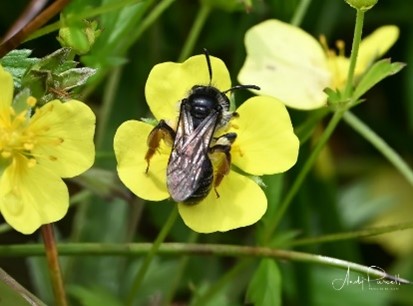Parks and countryside
Bee ‘beaches’ to be created as habitats for rare pollinators in West Midlands lost heathland landscape
Published on
Visitors to some of Walsall’s fantastic open spaces might notice some work in the coming weeks and wonder what it’s for. Walsall Council is continuing work to restore historic heathland habitats across eights sites in the West Midlands including the creation of bee ‘beaches’ to support the threatened tormentil mining bee and other pollinators.

The sites, spanning from Sutton Park in Birmingham to Cannock Chase in Staffordshire are part of the Purple Horizons Nature Recovery Project, coordinated by Natural England in collaboration with local councils and nature organisations.
The project, which takes its name from the purple heather which covers much of the heathland areas, aims to connect green spaces to allow the area’s reptiles, birds, and pollinators to move and thrive, which is crucial for the future climate-resilience of local species.
Diggers will be removing vegetation from the sites in Walsall and Lichfield, which are all remnants of a vast heathland landscape. The freshly dug earth will make space for bees and wasps to nest and provide suitable habitat for a range of species that use heathlands, such as common lizards.
One such threatened species is the tormentil mining bee which was once thought to be locally extinct but was rediscovered at Chasewater in 2022 and Brownhills Common this year. The tormentil mining bee, which is listed as a Priority Species in England, digs nesting burrows in soft soil banks or ‘beaches’. They feed their young almost exclusively on the pollen of tormentil, a rare wildflower that grows on acidic sandy soils.
The team, who include the Birmingham and Black Country Wildlife Trust and Walsall conservation volunteers, are encouraging a greater abundance of tormentil flowers by propagating plants from locally collected seed and cuttings, ready for planting out in the spring.
“ We have a real opportunity here to try and help save the tormentil mining bee from becoming extinct in Britain. Although the bee beaches we create will be quite a stark contrast to the surrounding grass and heathland initially, over time the patches of bare earth will allow the heathland to re-establish itself to its former glory. “
Nationally, around 80% of heathlands have been lost since 1800 and globally the habitat is rarer than a tropical rainforest. Historically, cattle grazing helped to keep the spaces open and free from overgrowth but as the use of these landscapes changed over time, they have become overpopulated with trees and shrubs. This has led to a decline in the availability of natural heathland spaces which are crucial for the survival of certain rare plants and insects.
Purple Horizons also hopes to create more connected nature-rich spaces for local people to access and enjoy, so they can experience the positive health and wellbeing benefits associated with spending time in nature.
“ The Purple Horizons project offers our residents and community members the chance to reconnect with and move through the wonderful natural environments that are right on their doorstep. People’s mental and physical health can benefit hugely by spending time in these beautiful natural spaces.
The proposed site clearing and scraping works are a crucial part of the project’s nature recovery mission and will help to ensure the protection and development of some of our most valued green spaces and the species that inhabit them. We must act to protect these green spaces now, so that they can be enjoyed by our communities and wildlife for many years to come. “
“ The Purple Horizons Nature Recovery Project is all about recreating and restoring nature rich places which will make a big difference to endangered species such as the mining bee. Having more nature rich places in Walsall and Lichfield is great for us, vibrant green spaces to enjoy which will also help reduce the effects of climate change. The Project is another important step to recover and restore nature in the West Midlands. “
Walsall Council is working with the Canal & River Trust, Lichfield Council and Staffordshire County Council to deliver the works which will take around two weeks.
Ends
Notes to editor:
- Sites where works are taking place are: Barr Beacon, Shire Oak, Brownhills Common, Pelsall North Common and Pelsall Middle Common (managed by Walsall Council), Chasewater (managed by Staffordshire County Council), Muckley Corner and Wharf Lane (managed by Lichfield District Council).
- Purple Horizons began in August 2021 and is one of twelve landscape-scale nature recovery projects launched by Defra and Natural England across the country to help counter biodiversity loss and climate change and protect public health. The delivery of nature recovery projects is a commitment in the government’s Environment Improvement Plan.
- The design and monitoring of this project is part of a UKRI-NERC funded PhD research project at the University of Birmingham, with the Birmingham and Black Country Wildlife Trust as a CASE partner.
- This project is receiving £25,000 of funding from Natural England via the Species Recovery Programme. This programme contributes to the Environment Act target to reduce the risk of extinction.
- Natural England (NE) has been delivering its flagship Species Recovery Programme (SRP) for over 30 years focusing on bespoke conservation action to reverse the fortunes of our most threatened native species.
- Natural England is a non-departmental public body in the United Kingdom sponsored by the Department for Environment, Food and Rural Affairs.
- Find out more about Natural England.